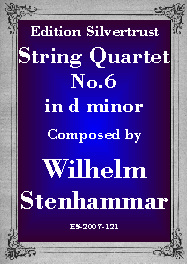Presents
Wilhelm Stenhammar
String Quartet No.6 in d minor, Op.35
 Stenhammar's
sixth and finale string quartet was composed in 1916. It was not a particularly
happy time. It distressed him that World War One was destroying the old European
civilization and on a personal level, his closest musical friend, the Swedish
Violinist Tor Aulin, had recently died. Hence the moods expressed in the Sixth
Quartet are those of sadness, depression, anger, and resignation. One is
reminded of the same moods found in Beethoven's last quartets, and, it is a
certainty that Stenhammar had those works in front of him at the time he
composed String Quartet No.6.
Stenhammar's
sixth and finale string quartet was composed in 1916. It was not a particularly
happy time. It distressed him that World War One was destroying the old European
civilization and on a personal level, his closest musical friend, the Swedish
Violinist Tor Aulin, had recently died. Hence the moods expressed in the Sixth
Quartet are those of sadness, depression, anger, and resignation. One is
reminded of the same moods found in Beethoven's last quartets, and, it is a
certainty that Stenhammar had those works in front of him at the time he
composed String Quartet No.6.
Stenhammar's six string quartets are widely regarded as the most important written between those of Brahms and Bartok. Tonally, they range from the middle late Romantics to late Sibelius. Though not unknown by the Swedish chamber music public, his string quartets have been sadly neglected elsewhere.
Stenhammar (1871-1927) was trained as a pianist, became a virtuoso and was considered the finest Swedish pianist of his time. Concert pianists who venture into the realm of the string quartet often wind up writing compositions which sound like they were composed at, and are perhaps better played at, the piano. That Stenhammar's works show no such trait is due entirely to the fact that for nearly half of his life, he worked intimately with the Aulin Quartet, the top Swedish string quartet of its day and one of the best then performing in Europe.
The opening movement to Quartet No.6, Tempo moderato un poco rubato, though not funereal, clearly conveys the feelings sadness and loss. The tempo never speeds up and the players are warned off keeping a strict tempo. The Allegro which follows, while not exactly bright, does have a lighter bustling, if somewhat subdued quality. Next there is a beautiful, Poco adagio, valedictory and resigned. It is in the startlingly powerful finale, Presto, that highly charged emotional torrents are released. The main theme is a reverse paraphrase from the scherzo of Beethoven's Ninth Symphony. Long unisono passages give the music an almost unmatched intensity in the literature and remind one of the power of a Sibelius symphonic work.
This is an outstanding masterwork. Stenhammar had pared down his technique to achieve a taut simplicity and the work plays easily with few if any real technical difficulties. Though it belongs in the concert repertoire, amateurs will surely enjoy the chance to play a work of this caliber without struggling.
Parts: $24.95
Parts & Score: $31.95